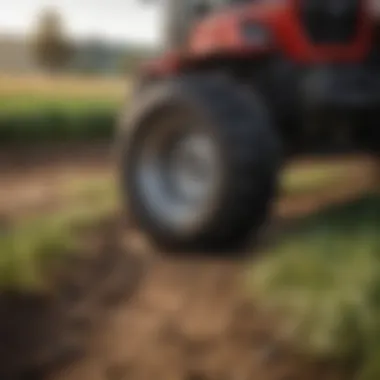Finding NSK Bearings for Agricultural Machinery


Intro
In the realm of agricultural machinery, efficiency and reliability are paramount. NSK bearings play a pivotal role in ensuring the smooth functioning of various equipment used in farming practices. This guide aims to unravel the complexities surrounding the acquisition and optimal use of NSK bearings in agricultural applications.
Understanding the importance of these bearings and their specifications is essential for agricultural operators, including farmers and agronomists. As modern agricultural techniques evolve, having a solid grasp of how to source the right bearings can greatly impact the effectiveness of machinery and equipment.
Whether you are looking to enhance performance, extend the lifespan of your equipment, or simply make informed purchasing choices, this comprehensive guide will cover everything you need to know about NSK bearings. From locating reliable suppliers to understanding product specifications that suit agricultural needs, every aspect will be addressed with clarity and detail.
As the agricultural sector advances, the mere choice of bearings can influence yield quality and operational costs. By delving into the specifics in this guide, you will be empowered to make beneficial decisions that enhance your machinery’s productivity.
Understanding NSK Bearings
Understanding NSK bearings is essential for anyone involved in or reliant on agricultural machinery. Bearings play a crucial role in the overall functioning of equipment used in farming, from tractors to harvesters. They are vital components that support rotating or moving parts, allowing machinery to operate efficiently. When it comes to agricultural applications, the correct selection and maintenance of bearings can greatly influence the performance and longevity of the equipment.
Definition and Purpose
NSK bearings are a type of rolling-element bearing manufactured by NSK Ltd., a well-known global leader in bearing technology. These bearings are designed to minimize friction between moving parts, facilitating smooth operation. The primary purpose of these bearings is to support radial and axial loads while allowing for relative motion between various machine parts. Additionally, they help reduce wear and tear on machinery, leading to more efficient operations and lower maintenance costs over time.
Choosing the right type of NSK bearing for specific applications involves understanding their classification—such as ball bearings, roller bearings, and specialty bearings. Each type has its design characteristics that suit different operational needs in agricultural machinery.
Importance in Agriculture
The importance of NSK bearings in agriculture cannot be overstated. Farms today use increasingly complex machinery to meet productivity demands. Here are some key points to consider regarding their significance:
- Durability and Reliability: Agricultural equipment is often subjected to harsh environments. NSK bearings are built to withstand these conditions, providing reliability and extending machinery life.
- Efficiency: Well-functioning bearings contribute to the overall efficiency of agricultural equipment. They allow machinery to move smoothly, ensuring optimal energy use and reducing fuel consumption.
- Maintenance: Properly selected and maintained NSK bearings can significantly reduce the risk of equipment failure. Regular inspection and lubrication can help farmers avoid costly downtimes that come with machinery breakdown.
"The right bearing can make all the difference in the performance of agricultural machinery."
Types of NSK Bearings
Understanding the different types of NSK bearings is essential for anyone in the agricultural sector looking to enhance machinery performance and reliability. Each type of bearing serves a specific purpose and has unique characteristics, which can impact their suitability for various applications. Farmers and machinery operators must navigate these choices thoughtfully to ensure that they select the right bearings that meet their operational needs and efficiency goals.
Ball Bearings
Ball bearings are the most common type of bearing used in agricultural machinery. They consist of a set of balls that provide a low-friction surface for rotation. Their design allows for efficient handling of radial and axial loads. The primary benefit of ball bearings is their versatility. They can be found in various equipment, including tractors, harvesters, and irrigation systems.
Key considerations when selecting ball bearings include:
- Load capacity: These bearings are rated for specific loads. Make sure to match the load rating with your machinery's requirements.
- Speed: Ball bearings typically perform well at higher speeds. Ensure the selected bearings can handle the operation's speed.
- Installation: Proper installation is vital. Misalignment or improper mounting can lead to premature failure.
Roller Bearings
Roller bearings utilize cylindrical rollers instead of balls, offering a larger surface area for load distribution. They are designed to handle heavier loads compared to ball bearings. Roller bearings are crucial for agricultural applications that involve high loads and shock conditions, such as plows or combine harvesters.
When considering roller bearings, it is important to reflect on:
- Load capacity: Choose roller bearings that can withstand high radial and axial loads typical in agricultural settings.
- Friction and wear: Roller bearings may develop fatigue under continuous heavy loads. Ensure proper lubrication to minimize friction and wear.
- Types available: Different types of roller bearings exist, such as cylindrical, tapered, and spherical. Each type has specific advantages based on the application, which will affect performance.
Specialty Bearings
Specialty bearings encompass a category of bearings designed for specific applications or environments. These bearings might come with unique features such as sealed designs or resistance to extreme temperatures and chemicals. Farmers can benefit from using specialty bearings in equipment exposed to harsh environments.
Considerations for specialty bearings include:
- Specific features: Look for bearings with seals or shields to protect against contaminants, especially in muddy or dusty conditions common in agriculture.
- Temperature rating: Ensure that specialty bearings can withstand the temperature ranges in which they will operate.
- Cost versus benefit: While specialty bearings might have a higher upfront cost, their durability may result in lower replacement frequency and maintenance costs over time.
It is essential to understand that choosing the right type of NSK bearing can significantly influence the overall effectiveness and lifespan of agricultural machinery.
In summary, understanding the distinct types of NSK bearings ensures informed decisions that lead to enhanced performance and reliability in agricultural machinery. Proper selection plays a foundational role in achieving long-term operational efficiency.
Locating Suppliers


Finding the right suppliers for NSK bearings is crucial for ensuring the reliability and efficiency of agricultural machinery. The complexity of modern farming requires equipment that can endure significant operational demands. Therefore, sourcing high-quality bearings is not just a matter of convenience; it directly impacts the performance and lifespan of machinery. Understanding where to find these suppliers can save time and reduce costs, ultimately benefiting all stakeholders in the agricultural sector.
Online Resources
The internet has revolutionized how farmers and agricultural professionals source NSK bearings. Online platforms provide access to a wide array of suppliers, allowing users to compare products, prices, and reviews. Websites like Alibaba and ThomasNet list various manufacturers and authorized distributors of NSK products. Searching for specific NSK products through manufacturers' websites can also yield valuable insights into what is available.
Using forums and discussion boards, such as Reddit, offers opportunities to gather recommendations from industry peers. Engaging with community members can provide guidance on trusted suppliers and up-to-date information about product quality.
Key points of online resources include:
- Convenience of 24/7 access
- Ability to compare prices and products
- Availability of user reviews and testimonials
- Access to forums for personal recommendations
Local Dealers
Local dealers play a vital role in sourcing NSK bearings. They provide personalized service and often have a deeper understanding of regional agricultural needs. Farmers can benefit from building relationships with local dealers, as they can offer tailored solutions based on specific equipment or agricultural practices. Local dealers typically stock popular bearings, making immediate purchases possible and ensuring less downtime in machinery.
Additionally, these dealers often provide installation services, ensuring that the bearings are fitted correctly, thus enhancing reliability.
Considerations for working with local dealers include:
- Personalized service
- Expert knowledge of local farming practices
- Quick access to necessary parts
- Potential for warranty services on purchased parts
Distributor Networks
Distributor networks represent another significant channel for procuring NSK bearings, especially for larger operations or organizations needing bulk purchasing. NSK has established extensive distributor networks that can provide a variety of bearings and related products. These distributors usually maintain large inventories and offer logistical support for shipping and handling.
Working with established distributors can also lead to cost savings, given their capacity to negotiate bulk rates or combined shipping for multiple orders. Furthermore, many distributors offer educational resources to buyers, helping them understand which bearing types best meet their needs.
Benefits of using distributor networks include:
- Access to extensive inventories
- Competitive pricing structures
- Logistical support for delivery
- Educational resources and technical assistance
Always ensure that you’re engaging with authorized suppliers to maintain the integrity of your equipment.
Identifying the Right Bearings for Your Needs
Selecting the appropriate bearings for agricultural machinery is a crucial step for maintaining efficiency and reliability. Bearings play an essential role in reducing friction and managing loads within equipment. To ensure optimal performance, it is important to consider several factors, including load capacity, speed ratings, and operating conditions. Each of these aspects contributes to the longevity and functionality of the bearings, ultimately impacting the overall performance of the machinery.
Load Capacity Considerations
Load capacity is a critical consideration when choosing NSK bearings. It refers to the maximum load a bearing can support while still functioning adequately. In agricultural applications, machinery often experiences varying load conditions based on the tasks being performed. It is essential to analyze the typical workload of the equipment.
- Static Load: This type of load occurs when the machinery is stationary. Bearings must be able to support this without undergoing permanent deformation.
- Dynamic Load: This is the load experienced during operation, which can fluctuate. Understanding the dynamic loads helps in selecting bearings that can withstand these conditions.
Choosing bearings with a suitable load rating helps prevent premature failure of the machinery. Operators should consult NSK's load capacity specifications for different bearing types to ensure the right match is made.
Speed Ratings
Speed ratings indicate the maximum operational speed of the bearing. This is equally vital for agricultural machinery as higher speeds can lead to increased heat and potential failure. Knowing the speed limits aids in matching the bearing to the expected operational tempo. The following points are significant:
- Continuous Operation: Certain agricultural machinery may run for extended periods. In such cases, selecting bearings rated for continuous operation is important to avoid overheating.
- Intermittent Use: For machinery used intermittently or for short bursts of speed, lower speed-rated bearings might suffice.
Estimating the average working speed helps ensure that the selected NSK bearings will perform optimally under typical working conditions, hence prolonging service life.
Operating Conditions
The operating environment greatly affects bearing performance. Factors like temperature, humidity, and exposure to dirt and dust must be evaluated. Different operating conditions dictate the choice of materials and seal types for bearings. Important considerations include:
- Temperature Range: Bearings operating in high-temperature environments require specific materials to maintain performance.
- Contamination: Ensuring that the bearings are protected from contaminants is vital for longevity. Sealed or shielded bearings may be a better choice in dusty agricultural settings.
Ultimately, a thorough understanding of the operating conditions can influence the selection of NSK bearings. This careful attention helps in maximizing efficiency and reducing maintenance costs.
Understanding the process of identifying the right bearings ensures that agricultural machinery runs smoothly and reliably. By focusing on load capacity, speed ratings, and operating conditions, farmers can mitigate risks, enhance equipment performance, and improve productivity in the field.


Ensuring Bearing Performance
Ensuring the performance of NSK bearings is essential in agricultural machinery. The right bearings enable smooth operation, which can enhance the efficiency and lifespan of your equipment. Poorly functioning bearings can lead to unplanned downtime, increased costs, and potential damage to the machinery. Therefore, understanding the best practices related to installation, maintenance, and troubleshooting is critical for farmers and agricultural professionals.
Installation Practices
Proper installation of NSK bearings is foundational for optimal performance. It begins with selecting the right bearing size and type based on the machinery specifications and requirements. Here are important practices to consider during installation:
- Cleanliness: Ensure that the work area and the components are free from contaminants. Dust or foreign particles can cause premature wear.
- Correct Tools: Use appropriate tools to avoid damaging the bearings during installation. For instance, a bearing press can help evenly distribute the force.
- Alignment: Double-check the alignment of the bearings and associated components. Misalignment can lead to uneven load distribution and excessive wear.
- Tightening: Follow manufacturer specifications when tightening any fasteners to avoid over-tightening or under-tightening, which may affect performance.
These installation practices can significantly influence the bearing's operational longevity and reliability.
Regular Maintenance Protocols
Regular maintenance of NSK bearings is crucial to uphold their performance and extend their functional life. Implementing a systematic maintenance routine enhances the reliability of agricultural machinery. Key maintenance protocols include:
- Lubrication: Ensure that bearings are adequately lubricated according to the manufacturer's guidelines. Insufficient lubrication can lead to increased friction and heat.
- Inspection Schedule: Institute regular inspection intervals to check for signs of wear or damage. Early detection can prevent more significant issues down the line.
- Temperature Monitoring: Monitor the operational temperatures of bearings. Unusually high temperatures may indicate inadequate lubrication or other underlying issues.
- Contamination Checks: Assess for signs of contaminant infiltration, which can impair bearing function. Regular cleaning and protection can mitigate this risk.
By adhering to these maintenance protocols, agricultural operators can promote the health of their bearings and, by extension, their machinery.
Troubleshooting Common Issues
Despite best efforts, issues with NSK bearings may still arise. Identifying and addressing these problems quickly is vital for maintaining performance. Common issues include:
- Noise: Unusual sounds can signal problems such as misalignment or insufficient lubrication. Addressing these problems promptly is essential.
- Vibration: Excessive vibrations may indicate bearing wear or misalignment. This may require realignment or replacement of the bearings.
- Overheating: Elevated temperatures can indicate lack of lubrication or excess load on the bearing. Investigation is needed to rectify the underlying causes.
Incorporating a proactive approach to troubleshooting can greatly enhance the operational efficiency of your agricultural machinery.
Remember: Early detection of issues allows for timely interventions, saving costs and extending the lifespan of your NSK bearings.
Taking maintenance seriously is not just about preserving bearings but also about protecting the overall investment in machinery.
Cost Considerations
Cost considerations are essential when it comes to sourcing NSK bearings for agricultural machinery. Making informed decisions about costs can profoundly affect a farmer's bottom line. Understanding the financial implications involved helps in evaluating the trade-offs between quality and price. Some bearings may be cheaper, but investing in high-quality NSK bearings can lead to lower maintenance costs over time. This section will provide insights into the average pricing of NSK bearings and offer guidance for budgeting replacements effectively.
Average Pricing of NSK Bearings
The average pricing of NSK bearings varies significantly depending on the type and specifications. Factors influencing price include bearing size, load capacity, and any specialty features.
Typically, ball bearings tend to have a lower average price compared to roller bearings. The average prices can range from $10 for basic models to over $300 for high-capacity or specialized bearings.
- Ball Bearings: Usually priced between $10 to $100,
- Roller Bearings: Expect costs from $20 to $150,
- Specialty Bearings: Can range from $50 to $300 or more,
The prices can fluctuate based on the supplier and market conditions. As such, it is prudent for farmers to compare prices from multiple suppliers. Checking online platforms, reaching out to local dealers, and exploring distributor networks can uncover a range of options and pricing models.
Budgeting for Replacement
Creating a budget for the replacement of NSK bearings is crucial for effective machinery management in agriculture. A well-prepared budget can help avoid unexpected expenses that arise due to bearing failures. To budget effectively, farmers should consider the following:
- Frequency of Use: Assess how often machinery is used. More frequent use will require more frequent replacements.
- Maintenance Schedule: Regular maintenance can prolong bearing life but knowing the replacement cycle is also essential.
- Cost of Downtime: Calculate potential losses due to machine downtime when bearings fail. This helps project the value of timely replacements.
By integrating these elements into a budget plan, farmers can ensure they have the necessary funds earmarked for replacements.
"Anticipating the need for bearing replacements is as vital as regular maintenance for machinery longevity."
Allocating a specific budget allows for more informed purchasing decisions. Ultimately, this approach can enhance operational efficiency and reduce the total cost incurred over time.
Sourcing NSK Bearings Near You
Finding NSK bearings locally holds great significance for individuals and businesses involved in agriculture. It offers several benefits, such as reducing lead times and shipping costs, ensuring timely access to essential components for machinery. Many farmers and equipment operators prefer to source bearings from local distributors to prevent delays during critical operational periods. Accessing NSK bearings from nearby locations assures quick replacements when machinery faces unexpected downtimes.


Local sourcing also provides the advantages of personal interaction and tailored customer service. Direct contact with local distributors can lead to better product advice according to unique agricultural needs. Distributors often have insights regarding the most suitable NSK bearings for specific equipment, which can significantly enhance the efficiency and performance of machines.
It is crucial to consider factors like the distributor's reputation and availability of inventory. Verify their credentials and assess feedback from other customers, which can guide decisions and minimize risks associated with sourcing bearings.
Finding Local Distributors
Local distributors serve as the most accessible option for acquiring NSK bearings. These entities often have relationships with the manufacturers, providing a direct channel for obtaining genuine parts. Searching for local distributors can be initiated through several avenues:
- Industry Networks: Often, local farming and equipment associations have preferred suppliers they recommend.
- Online Directories: Websites such as en.wikipedia.org offer lists of manufacturers and distributors linked to agricultural machinery.
- Word of Mouth: Peer recommendations can lead to trustworthy sources of NSK products.
"Choosing a distributor with a strong presence in the community can enhance the support you receive when sourcing NSK bearings."
When visiting local distributors, it is beneficial to prepare questions about specific requirements or peculiarities in your machinery. Having a clear idea of load capacity, operating conditions, and other specifications will help in selecting the most appropriate bearings.
Contacting Manufacturers Directly
Contacting NSK manufacturers directly can be an alternative approach, particularly for those seeking specific models or designs not readily available through distributors. Manufacturers often maintain a list of authorized sellers, ensuring they provide only genuine products.
When reaching out to manufacturers, consider these steps:
- Prepare Necessary Information: Have your machinery specifications and requirements ready. This can streamline the process when discussing your needs.
- Utilize Manufacturer Websites: Many companies provide contact forms or chat options for inquiries. Check their official websites for detailed support.
- Follow Up on Inquiries: If initial approaches do not yield prompt responses, follow up to demonstrate persistence and urgency in securing the bearings needed.
Establishing a direct line of communication with manufacturers can foster relationships that prove beneficial in the long run, potentially granting access to exclusive offers or insights into future products.
Environmental Considerations
When discussing bearings, it is essential to address environmental considerations. The agricultural sector has become increasingly aware of its impact on nature. In this context, NSK bearings play a crucial role. Proper attention to environmental factors can lead to better practices in agricultural machinery, fostering both sustainable operations and compliance with regulations.
Sustainability in Bearing Manufacturing
The manufacturing of bearings, including those made by NSK, involves various materials and processes. Sustainability in this industry is about minimizing resource use while maximizing efficiency. Manufacturers are now re-evaluating their production methods to reduce emissions and waste.
- Use of Recyclable Materials: Many companies are shifting towards materials that can be recycled once they reach the end of their use. This approach helps lessen the demand for new raw materials.
- Energy Efficiency: Modern manufacturing plants are adopting energy-efficient technologies. Using renewable sources like solar or wind power reduces the carbon footprint associated with production.
Investing in sustainable bearings not only supports environmental goals but can also influence operational costs. Efficient bearings result in less energy consumption in agricultural equipment, which can translate into financial savings.
End-of-Life Management for Bearings
End-of-life management is critical for reducing overall waste from bearings. Agriculture operations often overlook the disposal of worn-out bearings. Having a strategy for what happens to these components after their useful life can mitigate environmental impacts.
- Recycling Programs: NSK and other manufacturers may provide options for recycling old bearings. This process can recover valuable materials and reduce landfill waste.
- Proper Disposal: It's vital to follow local regulations regarding the disposal of bearings. Not all components can be simply thrown away.
- Education for Farmers: Training farmers and machinery operators about the environmental benefits of responsible bearing disposal can lead to better practices across the industry.
Adopting efficient practices in bearing usage and disposal not only assists the environment but also emphasizes the agricultural community’s commitment to sustainability.
Proper management of bearing life cycles directly supports environmental health and can lead to a more sustainable future for agricultural practices.
Future Trends in Bearing Technology
The landscape of bearing technology is continually evolving. This is particularly relevant in the agricultural sector, where efficiency and longevity of machinery are crucial. Understanding these trends not only helps in selecting the right bearings but also ensures optimal performance and cost-effectiveness in farming operations.
Advancements in Materials
The materials used in the manufacturing of bearings have progressed significantly. There is an increasing use of advanced composites and specialty steels which provide improved load capacity and durability. For instance, ceramic ball bearings offer lower friction and are resistant to corrosion. This can enhance the lifespan of agricultural machinery, reducing downtime and maintenance costs. Lightweight materials are also becoming more popular, resulting in overall weight reduction of the machinery, contributing to better fuel efficiency.
Some key advancements include:
- Hybrid Materials: Combining ceramic and steel to create stronger bearings.
- Coatings: Utilizing specialised coatings that reduce friction and wear.
- Self-lubricating Models: These require less maintenance, providing long-term reliability in harsh agricultural environments.
Smart Bearing Solutions
The integration of technology into bearings has led to the development of "smart bearings". These innovations enable real-time monitoring of the bearings' condition, predicting maintenance needs before failures occur. Smart bearings can help farmers by providing critical data on performance, such as temperature and vibration metrics.
Here are some benefits of smart bearing solutions:
- Predictive Maintenance: Reducing the risk of unexpected breakdowns.
- Data Analytics: Gathering insights into equipment performance that inform operational decisions.
- Increased Lifespan: By monitoring conditions closely, it is possible to avoid excessive wear and tear.
"Utilizing smart technologies in bearing applications can lead to a significant increase in the operational efficiency of agricultural machinery."
The future of bearings in agriculture indicates a shift towards more sustainable and intelligent applications. By staying informed about these trends, farmers can make better choices, enhancing the productivity and efficiency of their operations.















